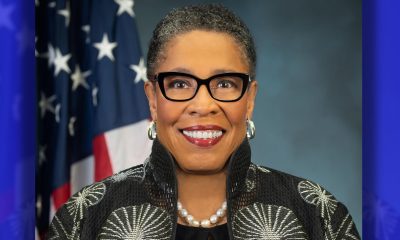Business
African American Chefs Break the Glass Ceiling in the Culinary World
NNPA NEWSWIRE — Many African American chefs often get stuck in the kitchen as sous chefs or line chefs and routinely don’t receive an opportunity to become head chefs, according to FSR. And, African American chefs, on the whole, have encountered tougher obstacles raising funds to open their own establishments.
By Stacy M. Brown, NNPA Newswire Correspondent
@StacyBrownMedia
The culinary business world is as cut throat as any other. It’s also known as an industry that hasn’t always allowed for much diversity in management and ownership at its higher echelon.
However, it appears that African Americans are finally breaking barriers, starring in many kitchens around the nation and serving up fine delicacies and treats that have those of all races and backgrounds coming back for second-helpings.
“Memphis is a foodie town with a minority-majority makeup… thoughtful discussions about equity in the food industry are at the forefront here and folks care about presentation, which is at the heart of the issue,” said Cynthia Daniels, the founder of Memphis Black Restaurant Week. “I’ve also seen the difficulty that black-owned restaurants experience with not having big marketing budgets to advertise for new business,” Daniels said.
That’s why she founded Memphis Black Restaurant Week and have advised other cities to do the same.
“It’s a celebration that advocates for black chefs, brings more awareness around their food and beverage traditions, generates new income, and moves the needle in terms of inclusivity in the culinary world,” Daniels said.
That inclusion and enthusiasm appears to have caught on.
“I am truly optimistic for the future with the culinary industry because while there are still a lot of areas in which to grow, we are slowly chipping away the stereotype of what African American chefs have to offer,” said award-winning executive chef and QVC Food Stylist Kristol Bryant.
“We are diversified in our skills, talents and cuisines. African American chefs are no longer just soul-food or southern cuisine chefs, we are so much more,” Bryant said.
“Through education and exploration, we can finally break into areas that we never knew were there. Being seen on television is great for us but being a legitimate authority in culinary in the corporate, private and entertainment sectors is the next step.”
An article in the culinary-centric publication, FSR Magazine, noted that when its reporters wrote about the rise of African American chefs in the U.S. three years ago, several themes prevailed, including that a wide range of talented African American chefs had emerged, like Executive Chef Edouardo Jordan in Seattle, Marcus Samuelsson in New York, and Mashama Bailey in Savannah, Ga.
Often, African American chefs are stuck in the kitchen as sous chefs or line chefs and routinely failing to be given an opportunity to become head chefs, according to FSR. And, African American chefs, on the whole, have encountered tougher obstacles raising funds to open their own establishments.
However, the industry now has several African American chefs serving as role models and paving the way for more minority chefs to make their mark in the U.S.
Examples include Chef Dieuveil Malonga, a 26-year old Forbes 30 under 30 Congolese Chef and a finalist for the Basque Culinary World Prize. Malonga works closely with luxury and fashion brands such as Rick Owens to bring awareness about the African continent through exclusive culinary experiences around the world.
With private clients like ASAP Rocky, Mos Def and others, Malonga has been featured by The New York Times, Vogue, BBC. He’s also spoken at The United Nations World Tourism Organization.
Chef Ronnie Rainwater of Delmonico Steakhouses also serves as another example of African Americans breaking the proverbial glass ceiling in the culinary world.
“He grew up in the kitchen, shadowing his Southern grandmother at the stove; anxious to taste anything he could get his hands on,” said Sade Mills of One 7 Communications.
Rainwater attended Western Culinary Institute in Portland, Oregon and obtained a Culinary Arts Degree in 1999. One of his early jobs in the industry was an internship in the kitchen at The Playboy Mansion in Beverly Hills, where he helped prepare dinners and private events for guests.
In June 1999, Ronnie was offered a position as a cook at Emeril Lagasse’s Delmonico Steakhouse at The Venetian and moved to Las Vegas.
In 2007, he was promoted to executive sous chef at the restaurant.
In January 2011, after working with Emeril for over 11 years at his restaurants in Las Vegas and on the East coast, he was tapped to become the next chef de cuisine of Delmonico Steakhouse.
“Today, he leads the kitchen at Delmonico and oversees all facets of its culinary operations, from sourcing products, to managing the restaurant’s in-house dry-aging program for prime U.S.D.A. beef, to crafting ambitious nightly tasting menus for guests at his kitchen table,” Mills said.
“His love of simple fresh ingredients has helped him cultivate close relationships with local farmers who supply the restaurant with their best products including beets, heirloom tomatoes, squash blossoms and seasonal herbs,” she said, noting that a local orchard provides him with fresh apples and cider, along with the apple wood used to brine and smoke the restaurant’s house cured bacon.
The rise of the African American chef also was seen at the 2018 James Beard Awards, where four African American and Caribbean American chefs were honored at the ceremony.
“There is a black hand in many pots and today, talented chefs are using their culinary skill-set as platforms to create, motivate and inspire,” said Charla Draper, a former food editor at Ebony and Southern Living magazines, who now serves as a consultant providing marketing services for food and food-related business.
“Chefs are using their talents traditionally and non-traditionally to mentor and open doors for others,” she said.
Bay Area
State Controller Malia Cohen Keynote Speaker at S.F. Wealth Conference
California State Controller Malia Cohen delivered the keynote speech to over 50 business women at the Black Wealth Brunch held on March 28 at the War Memorial and Performing Arts Center at 301 Van Ness Ave. in San Francisco. The Enterprising Women Networking SF Chapter of the American Business Women’s Association (ABWA) hosted the Green Room event to launch its platform designed to close the racial wealth gap in Black and Brown communities.

By Carla Thomas
California State Controller Malia Cohen delivered the keynote speech to over 50 business women at the Black Wealth Brunch held on March 28 at the War Memorial and Performing Arts Center at 301 Van Ness Ave. in San Francisco.
The Enterprising Women Networking SF Chapter of the American Business Women’s Association (ABWA) hosted the Green Room event to launch its platform designed to close the racial wealth gap in Black and Brown communities.
“Our goal is to educate Black and Brown families in the masses about financial wellness, wealth building, and how to protect and preserve wealth,” said ABWA San Francisco Chapter President LaRonda Smith.
ABWA’s mission is to bring together businesswomen of diverse occupations and provide opportunities for them to help themselves and others grow personally and professionally through leadership, education, networking support, and national recognition.
“This day is about recognizing influential women, hearing from an accomplished woman as our keynote speaker and allowing women to come together as powerful people,” said ABWA SF Chapter Vice President Velma Landers.
More than 60 attendees dined on the culinary delights of Chef Sharon Lee of The Spot catering, which included a full soul food brunch of skewered shrimp, chicken, blackened salmon, and mac and cheese.
Cohen discussed the many economic disparities women and people of color face. From pay equity to financial literacy, Cohen shared not only statistics, but was excited about a new solution in motion which entailed partnering with Californians for Financial Education.
“I want everyone to reach their full potential,” she said. “Just a few weeks ago in Sacramento, I partnered with an organization, Californians for Financial Education.
“We gathered 990 signatures and submitted it to the [California] Secretary of State to get an initiative on the ballot that guarantees personal finance courses for every public school kid in the state of California.
“Every California student deserves an equal opportunity to learn about filing taxes, interest rates, budgets, and understanding the impact of credit scores. The way we begin to do that is to teach it,” Cohen said.
By equipping students with information, Cohen hopes to close the financial wealth gap, and give everyone an opportunity to reach their full financial potential. “They have to first be equipped with the information and education is the key. Then all we need are opportunities to step into spaces and places of power.”
Cohen went on to share that in her own upbringing, she was not guided on financial principles that could jump start her finances. “Communities of color don’t have the same information and I don’t know about you, but I did not grow up listening to my parents discussing their assets, their investments, and diversifying their portfolio. This is the kind of nomenclature and language we are trying to introduce to our future generations so we can pivot from a life of poverty so we can pivot away and never return to poverty.”
Cohen urged audience members to pass the initiative on the November 2024 ballot.
“When we come together as women, uplift women, and support women, we all win. By networking and learning together, we can continue to build generational wealth,” said Landers. “Passing a powerful initiative will ensure the next generation of California students will be empowered to make more informed financial decisions, decisions that will last them a lifetime.”
Business
Black Business Summit Focuses on Equity, Access and Data
The California African American Chamber of Commerce hosted its second annual “State of the California African American Economy Summit,” with the aim of bolstering Black economic influence through education and fellowship. Held Jan. 24 to Jan. 25 at the Westin Los Angeles Airport Hotel, the convention brought together some of the most influential Black business leaders, policy makers and economic thinkers in the state. The discussions focused on a wide range of economic topics pertinent to California’s African American business community, including policy, government contracts, and equity, and more.

By Solomon O. Smith, California Black Media
The California African American Chamber of Commerce hosted its second annual “State of the California African American Economy Summit,” with the aim of bolstering Black economic influence through education and fellowship.
Held Jan. 24 to Jan. 25 at the Westin Los Angeles Airport Hotel, the convention brought together some of the most influential Black business leaders, policy makers and economic thinkers in the state. The discussions focused on a wide range of economic topics pertinent to California’s African American business community, including policy, government contracts, and equity, and more.
Toks Omishakin, Secretary of the California State Transportation Agency (CALSTA) was a guest at the event. He told attendees about his department’s efforts to increase access for Black business owners.
“One thing I’m taking away from this for sure is we’re going to have to do a better job of connecting through your chambers of all these opportunities of billions of dollars that are coming down the pike. I’m honestly disappointed that people don’t know, so we’ll do better,” said Omishakin.
Lueathel Seawood, the president of the African American Chamber of Commerce of San Joaquin County, expressed frustration with obtaining federal contracts for small businesses, and completing the process. She observed that once a small business was certified as DBE, a Disadvantaged Business Enterprises, there was little help getting to the next step.
Omishakin admitted there is more work to be done to help them complete the process and include them in upcoming projects. However, the high-speed rail system expansion by the California High-Speed Rail Authority has set a goal of 30% participation from small businesses — only 10 percent is set aside for DBE.
The importance of Diversity, Equity and Inclusion (DEI) in economics was reinforced during the “State of the California Economy” talk led by author and economist Julianne Malveaux, and Anthony Asadullah Samad, Executive Director of the Mervyn Dymally African American Political and Economic Institute (MDAAPEI) at California State University, Dominguez Hills.
Assaults on DEI disproportionately affect women of color and Black women, according to Malveaux. When asked what role the loss of DEI might serve in economics, she suggested a more sinister purpose.
“The genesis of all this is anti-blackness. So, your question about how this fits into the economy is economic exclusion, that essentially has been promoted as public policy,” said Malveaux.
The most anticipated speaker at the event was Janice Bryant Howroyd known affectionately to her peers as “JBH.” She is one of the first Black women to run and own a multi-billion-dollar company. Her company ActOne Group, is one of the largest, and most recognized, hiring, staffing and human resources firms in the world. She is the author of “Acting Up” and has a profile on Forbes.
Chairman of the board of directors of the California African American Chamber of Commerce, Timothy Alan Simon, a lawyer and the first Black Appointments Secretary in the Office of the Governor of California, moderated. They discussed the state of Black entrepreneurship in the country and Howroyd gave advice to other business owners.
“We look to inspire and educate,” said Howroyd. “Inspiration is great but when I’ve got people’s attention, I want to teach them something.”
Activism
Oakland Post: Week of April 17 – 23, 2024
The printed Weekly Edition of the Oakland Post: Week of April 17 – 23, 2024

To enlarge your view of this issue, use the slider, magnifying glass icon or full page icon in the lower right corner of the browser window. ![]()
-

 Activism4 weeks ago
Activism4 weeks agoOakland Post: Week of March 27 – April 2, 2024
-

 #NNPA BlackPress4 weeks ago
#NNPA BlackPress4 weeks agoCOMMENTARY: D.C. Crime Bill Fails to Address Root Causes of Violence and Incarceration
-

 #NNPA BlackPress4 weeks ago
#NNPA BlackPress4 weeks agoMayor, City Council President React to May 31 Closing of Birmingham-Southern College
-

 #NNPA BlackPress4 weeks ago
#NNPA BlackPress4 weeks agoBeloved Actor and Activist Louis Cameron Gossett Jr. Dies at 87
-

 Community1 week ago
Community1 week agoFinancial Assistance Bill for Descendants of Enslaved Persons to Help Them Purchase, Own, or Maintain a Home
-

 Activism3 weeks ago
Activism3 weeks agoOakland Post: Week of April 3 – 6, 2024
-

 Business1 week ago
Business1 week agoV.P. Kamala Harris: Americans With Criminal Records Will Soon Be Eligible for SBA Loans
-

 Activism2 weeks ago
Activism2 weeks agoOakland Post: Week of April 10 – 16, 2024
























































4 Comments